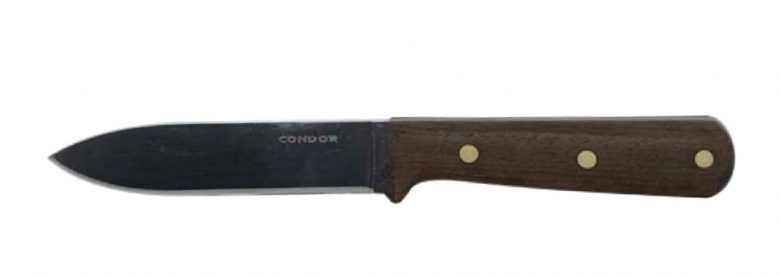The Knife. An honorable mention. The knife makes it onto my Baker’s Dozen list because everyone includes it in their lists too.
A knife is a very personal choice. Either folding or fixed-blades work. Doug Ritter’s site has an excellent article discussing how to choose a survival knife.
I am by no means a knife expert, but trolling though blogs and reviews has pointed me to these popular brands in no specific order: TOPS, Mora, Condor, Benchmade, Spyderco, Camillus, and Ontario Knife Company (OKC) , just to name a few that provide reasonably priced, excellent quality knives. The Mora and Condor knives are the most value-priced in this list. The great survivalist (from Dual Survival TV show fame) Cody Lundin has carried a wood-handled Mora for decades, and Surviorman (Les Stroud) works with Camillus and Helle of Norway, while Doug Ritter partnered with Benchmade to model his own knife design — based of course, off an existing popular Benchmade knife.
Currently I am proud to be carrying the Condor Kephart for my camping trips, pictured above. I’m partial to Condor because of their price point. I think its the best bang for the buck. I have no relationship with them, and get no benefits from them. Starting in 2018, I’m also carrying a blue plain-edge Benchmade 535 Bugout as a neck knife, since it is so light-weight. It is a surprisingly sharp and useful folder. Very happy with it.
Condor Tool & Knife make very competitively priced knives in El Salvador. What drew me to the Kephart knife was that it had a wooden handle with a rounded pommel (no sharp corners to poke holes in my backpack), a slightly longer 4.5″ blade that was just a bit thicker and more robust than a kitchen chef’s knife, and a gently curved finger guard. For my personal tastes, I also liked the weight and balance of the knife and I prefer the drop point blade profile, which has a good “belly” for all the slicing that I do when preparing the steaks and veggies to be grilled on the campfire. I also have the Condor Bushlore (large version) that I use for other purposes, and would consider the Condor Mayflower if it came in a 4″ version.
If this was my first blade, I would suggest a non-folder, with full tang, and at least a 3.5″ to 4.25″ blade. It will remind you of a basic kitchen knife which everyone is comfortable using. In fact, there is nothing preventing you from going to Target or Walmart, and getting a regular kitchen paring knife if you don’t want to spend $40+ on a heavier duty camping knife. Two additional recommendations are the Benchmade 15006 (2020 version) or 15008 (pre-2020) Steep Country, and the Kershaw Camp 5, both of which are great slicers.
Survival knifes usually boast a very thick blade, so they can withstand being pommeled to split wood, but I don’t agree with this use. You can always split wood by driving a wooden wedge into a log, and saving your knife blade for better uses. That is why I ALWAYS carry an axe when camping.
Jay Fisher has written the definitive article on the anatomy of a knife, you are interested in reading more about how a knife is put together and the various terms.




